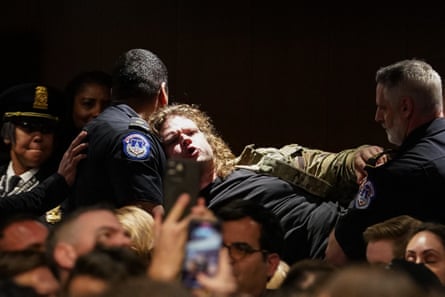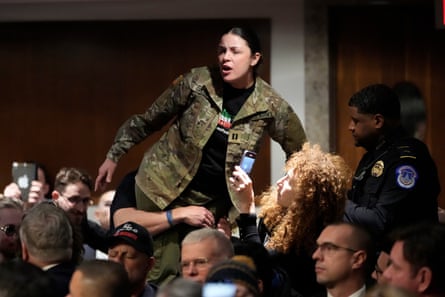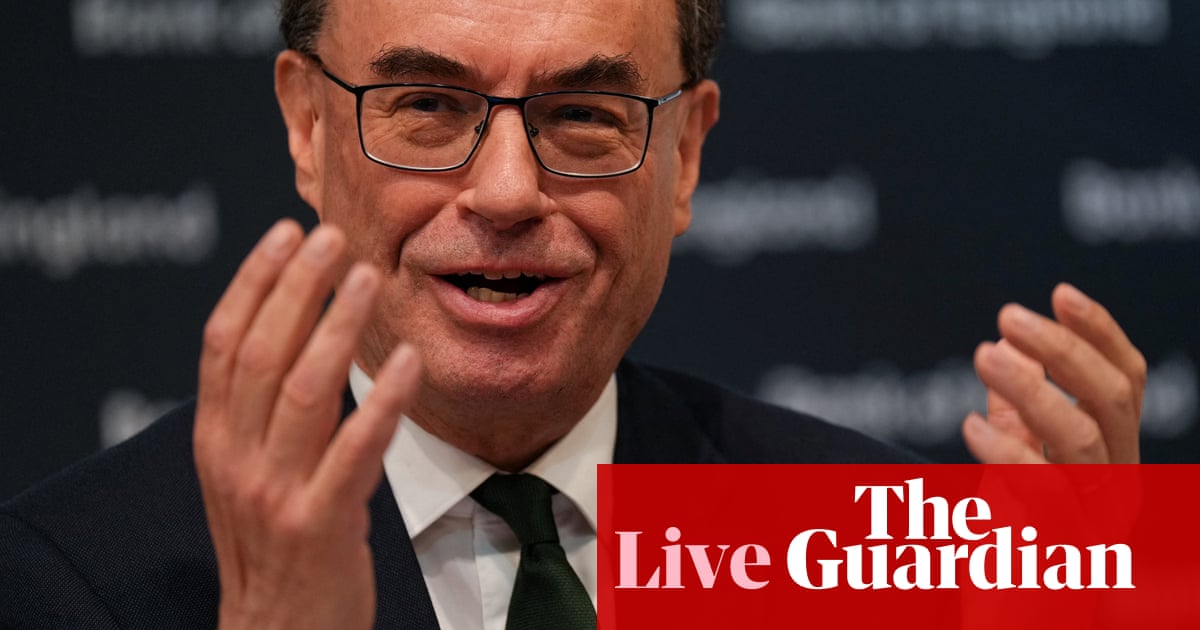Of the protesters who were forcibly bundled out of the hearing for Donald Trump’s defence secretary nominee Pete Hegseth at the Senate’s armed services committee on Tuesday, two were notable for their jackets.
With “US military” stitched over one breast pocket and their surnames on the other, Greg Stoker and Josephine Guilbeau are among thousands of veterans who have become a loud and visible presence in America’s anti-war movement.
With echoes of peace groups during the US wars in Vietnam and Iraq, the growing movement of military veterans has been using social media and demonstrations to protest against their government’s arming of Israel.
Josh Shurley, 49, a former army infantryman says military personnel have enough experience of conflict to view what they are seeing in Gaza as atrocities and feel a duty to speak up. Vice-president of Veterans for Peace, he says that over the past year there has been a swell of interest in the group, particularly from younger people.
Shurley believes this is driven by social media images coming from Gaza. “Every month we are getting three to four times the amount of phone calls from veterans wanting to join us than previous years,” he says. He believes the more combat an individual has seen, the more committed they are to peace, despite the military’s culture of loyalty and compliance making dissent difficult. Shurley points to Maj Harrison Mann, the most senior ranking US army official to resign over Gaza and says each time someone speaks out it makes it less intimidating for others.
More than 10,000 individuals “have been a part of our community over the past decade”, he says.

Former US army ranger Stoker, 35, began campaigning accidentally. On 10 October 2023, he was at home in Austin, Texas, watching on television the Israeli military bombing Gaza in retaliation for the murderous Hamas attack in Israel on 7 October.
“I called my friend Travis, ‘Are you seeing what I’m seeing?’” Stoker says.
The two self-professed “nerds” had met almost a decade earlier playing Dungeons and Dragons. Travis Jansz*, a former artillery officer, had done two tours in Iraq and Stoker four in Afghanistan.
“I was like, ‘Are they seriously dropping 1,000lb JDAMs [joint direct attack munitions] in one of the most densely populated places on Earth?’” Stoker recalls. “It was so egregious, it was so insane, that we had to just call each other to make sure we weren’t hallucinating. To not be gaslit by what was going on.”
The ordnance being used, they say, create a secondary blast of over-pressure that can injure or kill anyone within a 50-metre radius, with children the most vulnerable. A signoff on the use of such bombs, they say, would carry an understanding they would create a high number of civilian casualties.
“I’m watching all these ex-air force colonels,” says Stoker, “these officers who are now pundits for CNN and MSNBC and Fox News, get up in front of the nation, on legacy media and just straight up lie about American targeting practices. What’s acceptable, what adheres to the law of land warfare. They were just absolutely lying about everything.”
Feeling “cognitive dissonance”, Stoker took to social media. At that time he had 155 Instagram followers, “actual friends”. His searing Texas-flavoured takedowns of Israel Defense Forces propaganda using his warfare knowledge quickly gained him attention. When the IDF posted a photo on their X account of a small cache of electronics they claimed were Hamas’s suicide vest-making materials. Stoker countered: “It looks like the IDF robbed an electronic store so they can charge their Game Boys from the 1990’s. But explosive belts? Where’s the composition B?” The photo, he said, showed items used to charge devices using solar panels while the electricity to Gaza had been cut.
Now with 352,000 Instagram followers and a podcast, Colonial Outcasts, Stoker has become one of the most vocal anti-war veterans.
“As combat veterans we know deep down that we are seeing war crimes,” he says. “And how are those defensible? We have to speak out.”
Former army captain Brittany Ramos DeBarros, 36, is a director of About Face: Veterans Against the War, founded by and for veterans of the post 9/11 era. For her group a rise in participation began in 2020 with the murder of George Floyd and has been steadily climbing for the past 14 months.
“Every time the mask is kind of pulled off – where it becomes harder and harder to cling to these fantasies that we are fighting for democracy and human rights and all of these things – more veterans reach out,” says Ramos DeBarros. “The vast majority of us joined the military for some economic reason but we also justify or make peace with that through the belief that we are going to help people or be of service or uphold the values we are told our country is about.”
Active service members have also registered opposition. Senior airman Larry Hebert, 26, took authorised leave to go on a hunger strike. Members of the military can legally protest as long as they are off-duty and not in uniform. Hebert stood outside the White House wearing a placard that read “Active duty airman refuses to eat while Gaza starves”. After nine days, his leave was terminated and he was called back to base.
After the killing of five-year-old Hind Rajab, US special forces veteran Alan Shebaro addressed his city council at a public hearing saying: “This is not a war. This is the pure definition of ethnic cleansing. This has to stop.”

Veterans have protested outside weapons manufacturers and air force bases, marched more than 1,000km (620 miles) from Maine to Washington DC, sat in at student encampments, petitioned, launched social media campaigns and stalked the halls of Congress to share outrage at the continued supply of weapons to Israel.
Guilbeau, 36, a former army captain, spent much of her career as an intelligence officer at the Defense Intelligence Agency. That background is what led her to start saving photos of every dead child in Gaza she saw on her social media feed. The album on her phone now contains thousands of images. “I don’t need to know what the media says,” she says. “I can see with my own eyes what is happening.”
She resigned in November 2023 after 17 years of service.
The mother of four had been out for pizza with her family in Lafayette, Louisiana. Her mother and sister were getting increasingly irritated that she wouldn’t stop talking about the war. “Why don’t you just tell the whole world?” goaded her sister. Guilbeau decided to accept the challenge.
after newsletter promotion

Guilbeau has been relentless, posting to her 19,000 Instagram followers as she began spending every other week in Washington where, along with Veterans for Peace, she visited every Congress member, delivering letters demanding an arms embargo to Israel and an investigation into alleged criminal acts by Biden administration officials. The letter listed the statutes VFP say are being violated including the US War Crimes Act, Arms Export Control Act and the Leahy Law. All prevent weapons going to countries whose actions break the Geneva conventions or cause gross human rights violations. The letter was endorsed by Josh Paul, the most senior US state department official to resign over US policy on Gaza.
“I love it when someone tells me I’m being unpatriotic,” says Guilbeau. “I just look at them and ask, ‘Where did you serve?’”
“Patriotism is not blindly following our corrupt leaders. I’m protesting for an arms embargo not only for the people in Gaza but I have four children that need to have a future in this country.”
Guilbeau was wearing uniform when a video of her speaking outside the White House went viral. With her brass-buttoned jacket lined with service ribbons the contrast between her appearance and her words were striking: “Having a background in military intelligence I know we have the technology that we can see exactly who is in those locations and buildings,” she says. “So they are targeting and bombing homes knowing who and how many children are inside. The civilian casualties are catastrophic … this is not self-defence.”
Stoker sees the politics as a war of narratives. “Our role as veterans in that narrative is just to be there. Because it’s very hard to paint an entire movement as terrorist sympathisers when you’ve got a bunch of decorated white boys.”
In New York in September, former captain Rebecca Roberts, 30, attended a protest against Israeli prime minister Benjamin Netanyahu’s speech to the UN. Roberts saw the army as a way to impress her conservative father and get an education and enlisted at 17 on a programme that exchanges eight years of military service for a university scholarship. She became one of the first female combat-trained infantry soldiers, but found the beliefs she grew up with began to wane.
“I realised we’re such hypocrites,” says Roberts. “We’re the bad guy. We’re such bullies.”
She moved to the National Guard, ending up in recruitment. Watching young recruits come in on what she calls “the poverty draft”, was a tipping point for her. They were arriving from the same disadvantaged part of New Jersey that she came from, areas targeted by recruiters.

“I would have to go talk to the new recruits. We give them this speech, like, ‘Thank you for making a sacrifice for your country. Your family is going to be so proud. You’re defending democracy, freedom.’ It just got too weird.” Roberts resigned.
On the sweltering afternoon before Netanyhu’s speech Stoker, Jansz, Guilbeau and Roberts, sporting a varied combination of fatigue jackets, keffiyehs and combat boots, joined a crowd of thousands including veterans carrying a banner that said “Veterans Demand a Ceasefire Arms Embargo Now”. The army recruiting centre in Times Square was plastered with “ceasefire” stickers and Stoker stood in front of a screen running a gritty recruitment advertisement to livestream to his Instagram, “Take it from me kids,” he said. “You don’t want to give up your youth and bury your friends for this.”
The demonstration continued into the evening, gathering people, noise and momentum. By 9pm as protesters thronged up Park Avenue they drew the ire of the police and Jansz found himself surrounded by officers who handcuffed and arrested him and took him to a police station. He said the police officer who booked him had looked at his decorated army-issue jacket and asked where he’d got it. When Jansz told him it was his own, the officer said, ‘Oh, I thought you must have bought it in a thrift store.’”
Michael Messner, professor emeritus of sociology at the University of Southern California, has written two books on veteran activism “I was super impressed seeing the Vietnam veterans who were very active and really at the forefront of the movement. They were very effective in the long run and really did shift public opinion around the war because of the fact that they were veterans.”
Messner says veterans are following a path that began after the second world war, but with a generational shift. “The members of About Face are very progressive. Having, as I see it, more of an intersectional understanding of oppression. That’s race, class, gender, colonial, anti-colonial, LGBTQ+, environmental destruction. You know, they have a very, very organic, intersectional perspective on who they are and what they’re doing. It’s not just anti-war work that they are doing. That’s why they jumped in feet first when Black Lives Matter happened, they understand how it all connects.
“I think the effectiveness of their [veterans’] action is dispersed in ways it’s hard to measure, but I think it’s very, very powerful.”
He says the general public was more engaged with the Vietnam peace movement due to the draft: “With the so-called volunteer army it’s really a kind of economic draft. Guys have said to me, ‘if the draft still existed and middle-class kids might have to fight, then the anti-war movement would be a lot more robust’.”
*Name has been changed

.png) 3 months ago
37
3 months ago
37













































